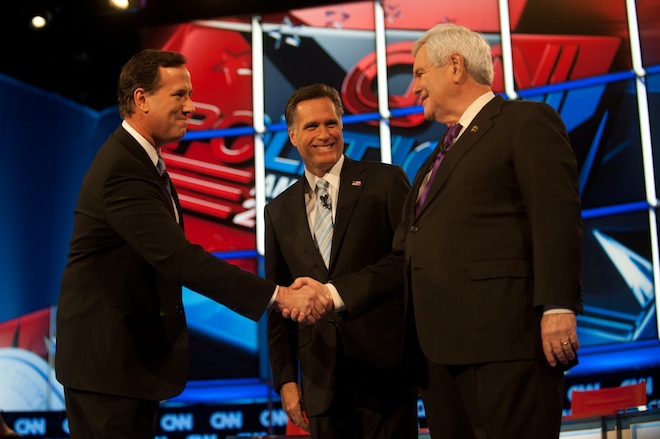A key test for the political establishment and the media this campaign cycle will be whether they accurately explain the Presidential candidates’ budget plans to voters, or whether they allow the candidates to spin their way out of the severe implications of their own proposals. The election will hinge to a large extent on the two parties’ visions for the role of the federal government and how to pay for it, and keeping the taxing and spending implication of those visions clear is the key to helping voters make informed decisions at the polls.
An event hosted Thursday morning by the fiscal discipline hawks at the Center for a Responsible Federal Budget offered this corner of the establishment an early critique of the GOP candidates’ tax and spending plans — all of which drew mixed reviews or worse.
“We have a historically low rate of taxation per GDP. I think we’re in the 15 to 16 percent range, spending in the 23 to 24 percent range,” said Vic Fazio, a former Democratic Congressman. “That gap has to close. Most if not all of these tax proposals would widen it.”
The GOP plans are all marked by large, swift cuts to federal revenue, achieved largely by lowering taxes on the wealthy, matched with vague cuts to support programs like Medicare, Medicaid and Social Security, and the dubious assertion that the tax cuts will largely pay for themselves — a claim former Republican congressman Bill Frenzel called “wishful thinking translated into public policy.”
The result, according to CRFB figures, isn’t fiscal discipline, but a smaller federal government.
We recreated this chart from Figure 1 in this paper (PDF). CRFB’s baseline is dubious — it assumes all the Bush tax cuts are extended, and all the spending cuts triggered by the Super Committee’s failure are wiped out, without being replaced. As a result, it makes the candidates’ plans look more fiscally responsible than they actually are. But crucially, all of the plans except Ron Paul’s continue to grow the debt as a percentage of GDP over time — something you wouldn’t guess listening to the candidates talk about themselves.
“I don’t expect Republicans to propose raising taxes,” said Alice Rivlin, a Brookings scholar, and former director of the Congressional Budget Office. “But it seems to me that one definition of responsibility is, Can you reform the tax system, are you proposing to reform the tax system in whatever you way you think is best, that at least doesn’t make the situation worse? And on that score, all of these candidates fail.”
On the other side of the balance sheet, the GOP candidates claim they’ll fill the budget hole their tax cuts create by slashing spending. But with few exceptions they don’t say how.
“We will have much better luck in demanding specifics,” during the general election, Frenzel admonished.
But that’s a matter of political expediency — not a fundamental handicap of the primary process. Ron Paul, for instance, has explained in great detail the severe steps he’d takes to shrink the federal government.
“You can expect them to at least give you examples of what they’re talking about,” Rivlin said. “Vague notions of $5 trillion which means almost nothing to anybody are I think not responsible.”
The panelists weren’t uniformly down on the plans. But their criticisms will be important signposts for media writing about candidate agendas in the remaining weeks of the primary and during the general election. And that should help keep the stakes clear.







